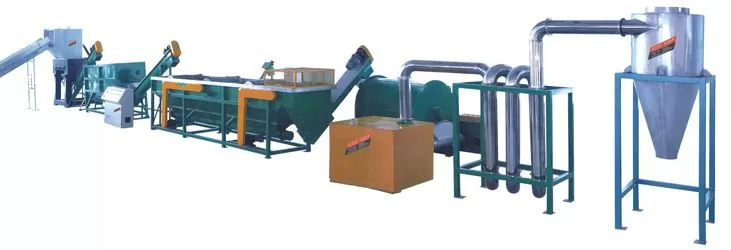Plastic waste – it’s everywhere. We all know the problem. Mountains of plastic waste piling up, choking our oceans, and littering our landscapes. It’s a challenge that requires innovative solutions. China, as a major player in global manufacturing and plastic production, has been at the forefront of tackling this issue. But what are the latest breakthroughs in China’s plastic recycling technology?

The latest breakthroughs in China’s plastic recycling technology focus on advanced sorting systems, chemical recycling, and enhanced biodegradable plastics. These innovations aim to increase efficiency, reduce environmental impact, and promote a circular economy.
Curious about how these technologies work and their impact? Let’s dive deeper into these exciting developments.
How Does Advanced Sorting Technology Work?
Sorting is a critical step in plastic recycling. Traditionally, sorting has been a labor-intensive and error-prone process. But with new advancements, China is changing the game. Using artificial intelligence and machine learning, advanced sorting systems can now identify and separate different types of plastics with remarkable accuracy.
These systems use sensors and algorithms to detect plastic types based on color, shape, and polymer composition. This reduces contamination and improves the quality of recycled materials.
What is Chemical Recycling?
Chemical recycling represents a significant leap forward in recycling technology. Unlike traditional mechanical recycling, which often downgrades plastic quality, chemical recycling breaks down plastics into their original monomers. This process allows for the creation of new, high-quality plastics from recycled materials.
Chemical recycling can handle a wider range of plastics, including those that are difficult to recycle mechanically. It also helps in reducing the reliance on virgin plastics, contributing to a more sustainable future.
How Are Biodegradable Plastics Evolving?
Biodegradable plastics are not new, but recent innovations have made them more viable and effective. In China, researchers are developing new types of biodegradable plastics that decompose faster and more completely. These materials are designed to break down under natural conditions, reducing the environmental footprint of plastic waste.
New biodegradable plastics can be used in a variety of applications, from packaging to agriculture. This development is crucial for reducing plastic pollution and promoting sustainability.
What Role Does Government Policy Play?
Government policy is a driving force behind these technological advancements. China has implemented stringent regulations and ambitious targets for plastic waste management. These policies incentivize innovation and investment in recycling technologies.
Policies such as the ban on single-use plastics and mandates for recycling infrastructure have accelerated the adoption of new technologies. This regulatory support is essential for driving progress in the industry.
How is Amige Contributing to These Innovations?
At Amige, we are committed to leading the charge in plastic recycling technology. Our team is continuously researching and developing new methods to improve recycling efficiency and reduce environmental impact. From cutting-edge shredders to advanced sorting systems, we are at the forefront of this technological revolution.
Our latest machines incorporate AI-driven sorting and enhanced shredding capabilities to handle diverse plastic waste streams. We believe in creating solutions that are not only effective but also sustainable.
What is the Future of Plastic Recycling in China?
The future looks promising. With continued innovation and support from both the government and private sector, China is poised to become a leader in plastic recycling technology. The focus will be on creating a circular economy where plastics are continuously recycled and reused, minimizing waste and environmental impact.
Future developments will likely include more efficient recycling processes, greater use of biodegradable materials, and smarter waste management systems. The goal is a sustainable future where plastic waste is a thing of the past.
Conclusion
China’s breakthroughs in plastic recycling technology are paving the way for a more sustainable future. From advanced sorting systems to chemical recycling and biodegradable plastics, these innovations are transforming the industry. As we continue to push the boundaries of what’s possible, we can look forward to a world with less plastic waste and a healthier environment.
At Amige, we are proud to be part of this journey, contributing our expertise and technology to drive progress. Let’s work together to create a cleaner, greener world. Thank you for reading!
